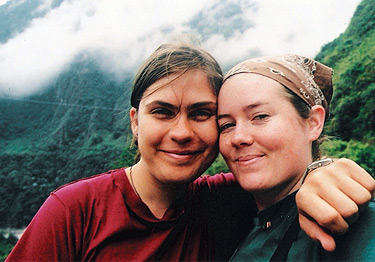The Mythical Traveler
Open gallery

Sydney Linden wrote this essay based on her experiences during an overseas study program to Ecuador in spring 2005. The program focused on the language, history, natural history, and socioeconomic institutions of Ecuador. Linden, who grew up in Colorado and New Mexico, is a junior majoring in sociology and anthropology. She works at the local chapter of Girls Inc. and helps coordinate a peer HIV/AIDS prevention and education program at Cascade AIDS Project. She plans to continue her work in the field of HIV/AIDS advocacy after college.
The story I want to tell takes place in March 2005. It takes place two months after arriving in Ecuador, meeting my wonderful host family, and becoming vaguely familiar with a language that wasn’t my own. It takes place in la selva, the Ecuadorian rain forest.
I had been looking forward to this five-day chunk of my overseas program since the previous semester. What I understood the jungle to be, underneath facts both anthropological and ecological, was a Crayola drawing from my childhood: thick green trees, orchids with blunt wax petals, and perhaps a cartoonish monkey or two. These images, however, would soon transform into the actual and flourish in vivid colors and three dimensions.
That first day consisted of many days, most of which we spent on a bus, riding deeper into the jungle. When I arrived in Misahualli, a tiny town on the edge of the Napo River, I was relieved, tired, and disbelieving. I was in the jungle.
Narcissa, our program leader, encouraged us to take a dip in the Rio Napo. We all walked through the center of town, towels tight in our hands due to the thieving monkeys in our midst. The swim, like that entire day, was dreamlike. As I climbed out of the water, I sensed the possibility of the fantastical that this place seemed to offer.
The next day began with a visit to a mariposeria (butterfly house), followed by a group fitting for rubber boots, our steadfast companions. Our method of transport for the day was a canoe, which we used to travel to various hiking and touring spots.
In the canoe, I was flying. That sense of exhilaration would return to me often in the days ahead. I felt as though I had stumbled into a wildlife film where the camera rapidly pans across the edge of the water and then zooms out to show only a dark snake of water in the midst of endless green.
Along with my compañeras, I spent the day (and most of the next one) walking through the jungle with our knowledgeable guide, Pepe. We were smelly from the wet and in awe of our surroundings. We visited a refuge for wounded animals, toured an indigenous people’s museum, learned about the medicinal qualities of jungle flora, and listened to lectures about the environmental and social impact of drilling for oil in the region. I was enthralled–absolutely interested in and engaged by everything that surrounded me. No descriptor for the jungle is more apt than alive, which is how I felt at every moment.
That night, the darkness was thick and the leaves of the trees seemed acrylic in their stillness. We joined hands as our guide led us along the path back to the ecoreserve, where we were staying. When I remembered to look up at the sky, my breath caught somewhere between my lungs and my ability to explain what I was seeing–the stars were phenomenal. How could I have stumbled upon this place? Everything, these stars above all, radiated with what I can only describe as magic.
The jungle, and that night in particular, slipped a piece of my imagination into an envelope and sent it on its way. Still, on occasion, I receive messages from it–usually by way of memory or dream.
Now, when I wake to the loud demands of my alarm clock, my fuzzy morning brain often cannot decide which early light it is seeing. Am I in Portland? My home in New Mexico? Ecuador?
As my sense of the here and now returns, I look through the window as the sun rises. The dawn is stretching, as I am, across a horizon of stories, both real and imagined.
More L&C Magazine Stories
Lewis & Clark Magazine is located in McAfee on the Undergraduate Campus.
MSC: 19
email magazine@lclark.edu
voice 503-768-7970
fax 503-768-7969
The L&C Magazine staff welcomes letters and emails from readers about topics covered in the magazine. Correspondence must include your name and location and may be edited.
Lewis & Clark Magazine
Lewis & Clark
615 S. Palatine Hill Road MSC 19
Portland OR 97219

